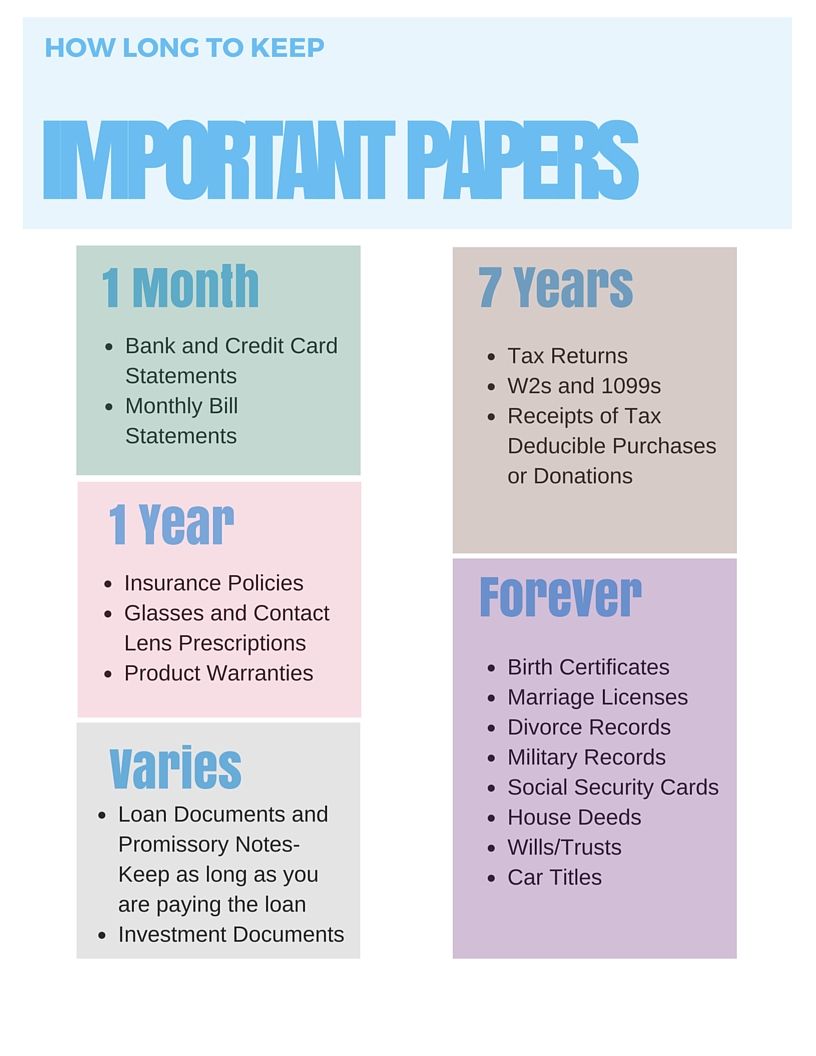How Long to Keep Tax Paperwork: The Ultimate Guide

Understanding Tax Record Retention

Keeping track of tax paperwork can often seem like an overwhelming task. However, understanding how long you should retain these documents is crucial for both compliance with tax regulations and personal financial management. This guide will delve into the nuances of tax record retention, offering insights on retention periods, organizational strategies, and practical tips for ensuring your records are both accessible and secure.
Why Keep Tax Records?

Before diving into the specifics of how long to keep tax paperwork, let's explore why retaining these documents is important:
- Evidence for Audits: Tax records serve as crucial evidence should you be audited by the IRS or other tax authorities.
- Maximize Deductions: Proper record-keeping allows you to track and claim all eligible deductions, thereby reducing your taxable income.
- Financial Planning: Historical tax records can be invaluable for personal financial planning, such as when applying for loans or estimating future tax liabilities.
- Legal Purposes: In cases involving disputes over inheritance, insurance claims, or legal issues, tax records can provide necessary documentation.
General Retention Periods for Tax Records

Here are the typical retention periods for different types of tax records:
| Document Type | Retention Period |
|---|---|
| Tax Returns | At least 3 years from the date of filing or 2 years from the date the tax was paid, whichever is later |
| Receipts, Proof of Deductions | Keep with tax returns for at least 3 years |
| Home Purchase or Sale Documents | 7 years |
| Capital Assets (Stock Transactions, Inheritances) | As long as you hold the asset and 3 years after selling it |
| Employment Taxes | At least 4 years after the tax becomes due or is paid, whichever is later |

📌 Note: These periods are general guidelines. If you underreport income by more than 25%, the IRS can audit you indefinitely. For complex cases or if you're unsure, consulting with a tax advisor is recommended.
Strategies for Organizing Tax Paperwork

Organizing your tax documents effectively can save time and reduce stress during tax season. Here are some strategies:
- Create a Filing System: Use folders labeled by year and document type. This could include folders for income, deductions, medical expenses, etc.
- Go Digital: Scan documents and save them digitally in secure, encrypted storage. This not only saves space but also makes sharing with accountants easier.
- Track Expenses Regularly: Use accounting software or apps to record expenses throughout the year, making tax time less hectic.
- Shred After Retention: To protect against identity theft, shred documents after the recommended retention period has passed.
Managing Digital Records

In an increasingly digital world, managing tax records can be made easier:
- Cloud Storage: Use secure cloud storage services like Google Drive or Dropbox to back up your documents. Ensure you use strong passwords and enable two-factor authentication.
- Electronic Filing: File your taxes electronically with the IRS or your local tax authority. Electronic records are easier to manage and less prone to physical damage.
- Regular Backups: Regularly back up your digital records to prevent loss due to hardware failure or accidental deletion.
⚠️ Note: While digital records are convenient, ensure you have robust security measures in place to protect against cyber threats.
Putting It All Together

Effective tax record management involves balancing compliance with the practicalities of document handling. By understanding retention periods, organizing both physical and digital documents, and maintaining security, you can streamline your tax process:
- Know your obligations to retain records according to IRS or local tax laws.
- Organize documents efficiently, reducing the time and effort needed during tax season.
- Implement security measures to protect sensitive information.
- Use technology to your advantage, making document management seamless.
By following these guidelines, you can ensure that when it comes to tax paperwork, you're not only prepared for audits or financial reviews but also optimizing your time and resources effectively. Keeping tax records is not just about meeting legal requirements; it's about managing your financial health smartly and proactively.
How long should I keep tax records if I overpaid my taxes?

+
If you’ve overpaid your taxes, you should keep the related tax records for at least 7 years, as this is the period during which the IRS can assess any additional tax due.
What should I do with old tax records?

+
Once the retention period for tax records has passed, you should securely dispose of them. Shred paper documents to prevent identity theft, and for digital records, ensure they are securely deleted or overwritten.
Is it safe to keep tax records only digitally?

+
Yes, digital records can be just as safe as physical documents if stored properly. Use encrypted storage, strong passwords, and enable two-factor authentication to secure your files.



